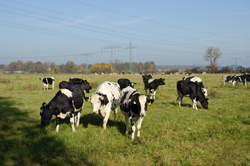SMEs empowered to help curb methane emissions
Livestock farming is a main contributor to greenhouse gas (GHG) emissions, accounting for up to 18 % of these emissions. CH4 is the second most important GHG produced mainly from fermentation in the digestive tract of herbivorous animals. For a long time, ruminant nutritionists have tried to reduce CH4 formation by developing novel dietary additives, such as plant extracts. However, a number of barriers to the development and marketing of additives exist, especially where SMEs are involved. The 'Technological platform to develop nutritional additives to reduce methane emissions from ruminants' (SMETHANE) project aimed at addressing the challenges faced by SMEs in this area. The consortium consisted of five research and educational organisations from four European countries, as well as six enterprises with expertise in developing nutritional additives. One aim of the project was to look at the stability of active molecules in plant extracts. Researchers incorporated the extracts into a feed meal and pelleted diet. They found that the stability of the molecules was compromised at higher temperatures, and during the pelleting process even at low temperatures. In vitro tests showed that the success of five compounds in reducing CH4 production depended on their concentrations and animal size. Certain concentrations affected volatile fatty acid (VFA) production that plays a crucial role in energy supply to the ruminants. In vivo tests showed no direct correlation to in vitro tests, particularly in required doses, with intermediate doses being more effective in in vivo trials. In addition, the team found that the effectiveness of additives and doses differed between small and large ruminants. Researchers also used farm trials to determine the effect of the additives on productivity and product quality. One finding here was that essential oils resulted in a significant increase in milk production and daily weight gain. By the end of the project, the team had much data on the effectiveness of nutritional additives in dairy and beef cattle, as well as small ruminants. This should aid the successful production, marketing and sales of the compounds by the involved SMEs.







